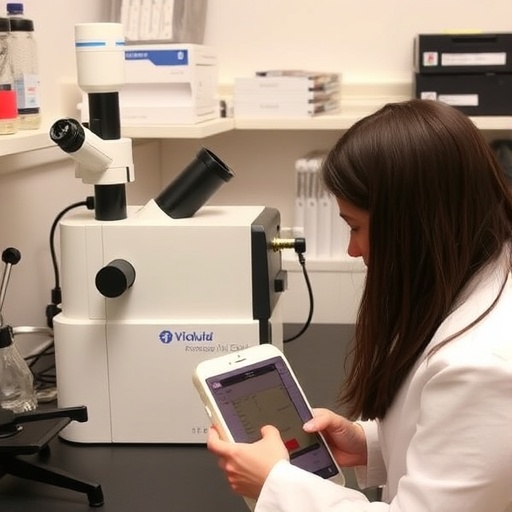Mucopolysaccharidosis (MPS) represents a group of rare, inherited lysosomal storage disorders characterized by the accumulation of glycosaminoglycans (GAGs) due to the deficiency of specific enzymes responsible for their degradation. A recent comprehensive study delves into the advancements in MPS diagnostics and treatment, highlighting the transformative impact of mass spectrometry (MS) techniques on our understanding and management of these conditions. With rising prevalence and awareness, the field of MPS research is evolving, promising enhanced patient outcomes through technological innovation and scientific rigor.
Mass spectrometry has emerged as a powerful analytical technique in biomedical research, including the field of rare metabolic disorders. The ability to analyze complex biological samples with high sensitivity and specificity provides researchers with invaluable tools for identifying enzymatic deficiencies and the abnormal accumulation of MPS metabolites. By utilizing mass spectrometry, physicians can achieve more precise diagnoses and tailor individualized treatment plans to improve quality of life for affected individuals.
The study presents case after case of MPS types, demonstrating how mass spectrometry has revolutionized clinical practices. For instance, the identification of heparan sulfate levels in patients with MPS I can lead to early detection, ultimately facilitating treatment before irreversible organ damage occurs. Traditional diagnostic methods often fall short of providing timely and accurate results, making mass spectrometry an invaluable asset within clinical laboratories globally.
Moreover, the researchers emphasize how the sensitivity of mass spectrometry enables the detection of minor variations in GAGs, paving the way for earlier diagnosis and more effective monitoring of therapy responses. Standard procedures may not fully capture the nuances of enzyme activity, especially in milder cases of MPS where symptoms may present late or not at all. The subtlety of mass spectrometric patterns elucidated during this research shifts our perspective on what constitutes a ‘normal’ metabolic profile.
In addition to diagnostic capabilities, the evolution of therapeutics for MPS highlights the necessity of mass spectrometry in the pharmacokinetic assessment of new treatment modalities. Enzyme replacement therapies and substrate reduction therapies require precise measurement of drug levels and patient-derived GAG excretion metrics to establish efficacy and safety profiles. The research illustrates that mass spectrometry is critical for not only assessing the success of treatments but also for understanding potential adverse effects during therapy.
The identification of biomarkers through mass spectrometry has also been a significant advancement in the field of MPS research. Biomarkers aid in evaluating disease progression, treatment adherence, and therapeutic outcomes. The researchers describe how specific GAG patterns can indicate the severity or stage of the disease, providing clinicians with a roadmap for managing treatment protocols effectively. In doing so, the scientists involved advocate for a shift towards biomarker-driven treatment plans in the clinical management of MPS.
Furthermore, the development of non-invasive sampling techniques combined with mass spectrometry, such as dried blood spot analysis, has the potential to increase access to screening and diagnosis for patients worldwide. This innovative method allows for the collection and transport of samples without the need for complex laboratory facilities, thereby facilitating easier and more widespread testing for these disorders. Simplifying the diagnostic process may lead to more timely interventions, ultimately improving healing outcomes.
Despite the promising advances brought forth by mass spectrometry, the authors contend that integration into clinical practice requires standardization and consensus among laboratory protocols to ensure consistency and reliability. The research highlights ongoing collaborative efforts among researchers, clinicians, and healthcare practitioners to refine these methods and translate findings into actionable clinical guidelines that can be universally applied.
As healthcare professionals continue to adopt mass spectrometry-based approaches, education and training become paramount. The new generation of clinicians must be adept at interpreting complex mass spectrometric data and understanding its implications in a clinical context. The research underscores the importance of developing educational initiatives aimed at fostering these skills among medical professionals engaged in the treatment of lysosomal storage disorders.
The potential of mass spectrometry is not limited to just MPS; the technology has applications across a spectrum of diseases. By refining our understanding of metabolic pathways and disease mechanisms, researchers are forging ahead with invaluable insights that could extend to broader genetic and metabolic disorders. The implications of this research transcend just MPS, marking a defining moment in the realm of personalized medicine.
Overall, the advancements highlighted in this study resonate with a broader narrative in biomedical science—one that underscores the importance of leveraging technology to tackle the most pressing challenges in rare diseases. The journey of understanding mucopolysaccharidosis has been accelerated by these advancements, and the transformative power of mass spectrometry may just be the key to unlocking the future of treatment protocols.
In summation, mucopolysaccharidosis research is entering a new era driven by the powerful capabilities of mass spectrometry. The potential for early detection, more precise diagnostics, enhanced therapeutic monitoring, and the development of individualized treatment plans positions this research at the forefront of tackling rare diseases. Continued exploration and investment in these innovative technologies will be essential to transform the landscape of therapies for MPS and beyond.
Subject of Research: Advances in mucopolysaccharidosis research
Article Title: Advances in mucopolysaccharidosis research: the impact of mass spectrometry-based approaches.
Article References:
Ramarajan, M.G., Garapati, K., Ghose, V. et al. Advances in mucopolysaccharidosis research: the impact of mass spectrometry-based approaches.
Clin Proteom 22, 44 (2025). https://doi.org/10.1186/s12014-025-09562-4
Image Credits: AI Generated
DOI: https://doi.org/10.1186/s12014-025-09562-4
Keywords: mucopolysaccharidosis, mass spectrometry, diagnostics, enzyme replacement therapy, biomarkers, personalized medicine.
Tags: biomedical research technologiesclinical practices in MPS managementearly detection of metabolic diseasesenzymatic deficiency identification techniquesglycosaminoglycan accumulation analysisinnovative treatments for MPSlysosomal storage disorder diagnosticsmass spectrometry in rare disordersmucopolysaccharidosis research advancementspatient outcomes in metabolic disorderspersonalized treatment plans for MPStransformative impact of mass spectrometry





